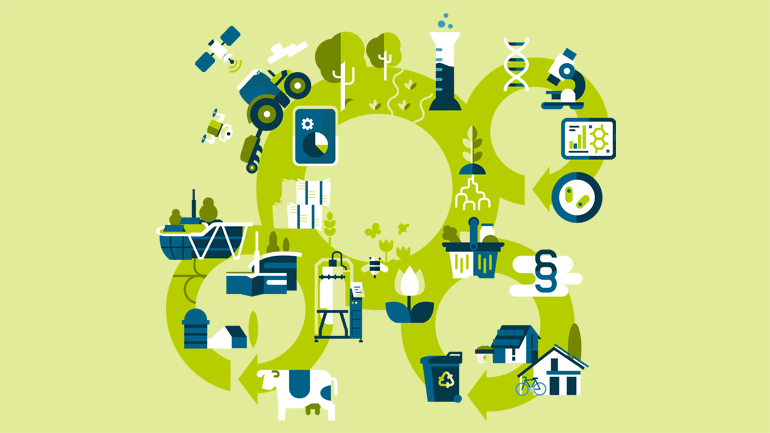
New Bioeconomy Council convenes for its constituent meeting
The Federal Ministry of Education and Research (BMBF) and the Federal Ministry of Food and Agriculture (BMEL) have appointed the members of the new Bioeconomy Council. They met in digital form on December 7, 2020 for their constituent meeting. The recently appointed third Bioeconomy Council will advise the German government as an independent and neutral body on the implementation of the National Bioeconomy Strategy adopted in January 2020 by issuing recommendations and statements, while at the same time promoting public debate on the bioeconomy. The members of the Council are appointed for an initial period of three years. With the constituent meeting, the Bioeconomy Council now begins its work.
Federal Research Minister Anja Karliczek said: “I am delighted that we have been able to attract high-ranking personalities from science, business and civil society to the Council. With their different backgrounds and expertise, the members cover a wide range of relevant perspectives on the bioeconomy”.
Federal Minister of Agriculture Julia Klöckner said: “There is enormous potential in the bioeconomy. At the same time, we need to discuss limits and conflicting goals. The Bioeconomy Council is a decisive body for this”.
The Bioeconomy Council’s members:
- Prof. Dr. Regina Birner, Lehrstuhl Sozialer und institutioneller Wandel in der landwirtschaftlichen Entwicklung, Universität Hohenheim
- Prof. Dr. Michael Böcher, Lehrstuhl für Politikwissenschaft mit Schwerpunkt Nachhaltige Entwicklung, Otto-von-Guericke-Universität Magdeburg
- Dr. Viola Bronsema, BIO Deutschland e. V.
- Prof. Dr. Thomas Brück, Werner Siemens-Lehrstuhl für Synthetische Biotechnologie, Technische Universität München
- Dr. Jürgen Eck, bio.IMPACT
- Prof. Dr. Peter Feindt, Albrecht Daniel Thaer-Institut für Agrar- und Gartenbauwissenschaften, Fachgebiet Agrar- und Ernährungspolitik Humboldt-Universität zu Berlin
- Prof. Dr. Maja Göpel, THE NEW INSTITUTE Foundation gGmbH
- Prof. Dr. Ulrike Grote, Institut für Umweltökonomik und Welthandel, Leibniz Universität Hannover
- Prof. Dr. Stefanie Heiden, Institut für Innovations-Forschung, Technologie-Management & Entrepreneurship ITE, Leibniz Universität Hannover
- Prof. Dr. Ralf Kindervater, BIOPRO Baden-Württemberg GmbH
- Prof. Dr. Thomas Lemke, Lehrstuhl für Soziologie mit dem Schwerpunkt Biotechnologie, Natur und Gesellschaft, Goethe-Universität Frankfurt
- Prof. Dr. Iris Lewandowski, Fachgebiet Nachwachsende Rohstoffe in der Bioökonomie, Chief Bioeconomy Officer (CBO), Universität Hohenheim
- Dr. Felix Prinz zu Löwenstein, Bund Ökologische Lebensmittelwirtschaft (BÖLW)
- Prof. Dr. Kai Niebert, Deutscher Naturschutzring (DNR)
- Prof. Dr. Monika Pischetsrieder, Lehrstuhl für Lebensmittelchemie, Friedrich-Alexander-Universität Erlangen-Nürnberg
- Prof. Dr. Klaus Richter, Lehrstuhl für Holzwissenschaft, Technische Universität München
- Prof. Dr. Imme Scholz, Deutsches Institut für Entwicklungspolitik (DIE)
- Dr. Beatrix Tappeser, Staatssekretärin a.D.
- Prof. Dr.-Ing. Daniela Thrän, Deutsches Biomasseforschungszentrum gemeinnützige GmbH (DBFZ)
- Dr. Markus Wolperdinger, Fraunhofer-Institut für Grenzflächen- und Bioverfahrenstechnik (IGB).
Background:
In 2009, the BMBF and the BMEL established the first Bioeconomy Council as an advisory body to the German government. With the end of the first council’s term, the second Bioeconomy Council took up its work in 2012 and supported the federal government in an advisory capacity until the end of 2019. The councils’ task was to provide important suggestions for the design of the National Research Strategy Bioeconomy 2030 and the National Policy Strategy Bioeconomy. In January 2020, the Federal Government adopted the National Bioeconomy Strategy under the joint leadership of the BMBF and BMEL. This strategy bundles the federal government’s various activities in the field of bioeconomy policy into an overall strategy. The recently appointed third Bioeconomy Council will advise the federal government as an independent and neutral body on the implementation of the strategy by issuing recommendations and statements and at the same time promote public debates on the bioeconomy.